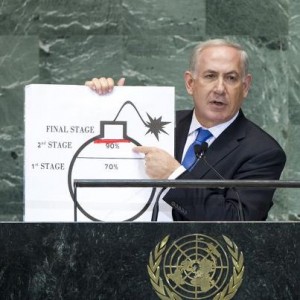Netanyahu Backs Off on Iran

While Israeli Prime Minister Netanyahu was belligerent in tone at the UN, he signaled a retreat on substance, postponing his threatened attack on Iran’s nuclear sites. That suggests he is reading the U.S. polls and thinks he may have to deal with President Obama in a second term, says ex-CIA analyst Ray McGovern.
The main takeaway from Israeli Prime Minister Benjamin Netanyahu’s U.N. speech was the inference that he has been forced to relent on the possibility of military action against Iran, with his threats deferred past the U.S. election on Nov. 6 and off into next spring and beyond.
His ominous intonation that “everyone should have a sense of urgency” about Iran “amassing enough enriched uranium to make a nuclear weapon” went over like a dead trial balloon – fatally punctured when he pushed the acute-worry-date into sometime in 2013:
Israeli Prime Minister Benjamin Netanyahu addressing the United Nations General Assembly on Sept. 27, 2012. (Photo credit: United Nations)
“By next spring, at most by next summer at current enrichment rates, they [the Iranians] will have finished the medium enrichment and move on to the final stage. From there, it’s only a few months, possibly a few weeks before they get enough enriched uranium for the first bomb.”
Netanyahu then resorted to an unusual visual aid, apparently in an effort to draw attention away from his more relaxed projection regarding how soon Iran could get the bomb. The Israeli prime minister reached down from the podium and lifted high a graphic of a round bomb with a fuse, like the one typically seen in a “Road Runner” cartoon.
“I brought a diagram for you,” Netanyahu said. “Here’s the diagram. This is a bomb; this is a fuse.” (Perhaps he was trying to trick the Iranians into mistaking the cartoon for the design of an actual bomb from Israel’s secret nuclear arsenal – and copy it as a schematic.)
Netanyahu used the crude drawing to depict the three main stages of uranium enrichment and pointed ominously to the “final stage” when he said Iran would have “enough high enriched uranium for the first bomb.”
Having failed to get President Barack Obama to draw a “red line” at that point in the nuclear process, Netanyahu brandished his own red marker and drew a bold red line on the diagram. The solid red line was clear enough, but ambiguity remains about exactly how to relate the red ink to actual developments on the ground and a reasonable timeline.
Moreover, due skepticism seems warranted, given Netanyahu’s unenviable record of dire predictions with respect to how soon Iran could get the bomb. If Netanyahu had been right initially, the Iranians would have had a nuclear weapon in the 1990s.
Netanyahu’s stunt with the poster also brought to mind Secretary of State Colin Powell’s infamous war speech in 2003 when he displayed crude graphics depicting imaginary mobile chemical weapons labs in Iraq.
The rest of Netanyahu’s speech was bromide and boilerplate, including the usual accusations that Muslims are “bent on world conquest” and want “to destroy Israel, Europe and America.” The speech also contained repeated attempts to conflate “a nuclear-armed Iran” with “a nuclear-armed al-Qaeda,” reminiscent of persistent efforts by the Bush administration and its “closest allies” to conjure up that very kind of alarming link between Iraq and al-Qaeda ten years ago.
Netanyahu insisted, for example, that “It makes no difference whether these lethal weapons are in the hands of the world’s most dangerous terrorist regime or the world’s most dangerous terrorist organization. They’re both fired by the same hatred; they’re both driven by the same lust for violence.”
But that argument would only appeal to the simpleminded or the true-believer. Al-Qaeda is a stateless terrorist organization that generally insinuates itself into lawless regions of countries with weak central authorities. It operates with no specific territorial headquarters, let alone an identifiable home country.
By contrast, Iran is a large nation with a history that dates back thousands of years. Unlike al-Qaeda, Iran could be easily targeted for retaliation if it did use a nuclear bomb, though its Supreme Leader, Ayatollah Ali Khamenei has denounced as immoral even the development of a nuclear bomb and insists Iran has no intention of building one.
From Domestic Abuse to Honeymoon
Perhaps having read recent polls suggesting that Obama has a strong chance of winning reelection, Netanyahu also dropped his abusive tone regarding the President’s refusal to shift the red line of war to simply Iran having the “capability” of building a bomb. Instead, the Prime Minister was effusive with praise for the politically buoyant Obama.
“I very much appreciate the President’s position [rejecting the possibility of a nuclear-armed Iran] as does everyone in my country. We share the goal of stopping Iran’s nuclear weapons program. … What I have said today will help ensure that this common goal is achieved. Israel is in discussions with the United States over this issue, and I am confident we can chart a path forward together.”
Is this the same Netanyahu who repeatedly lashed out at Washington’s reluctance to put the “red line” where he wanted? Is it the same Netanyahu who insisted, a mere two weeks ago, that – given that reluctance – the U.S. has “no moral right” to put pressure on Israel not to attack Iran?
Enter the real world. Both the U.S. and Israeli military are dead set against the disaster that war with Iran would bring. And both have made that quite plain to Netanyahu and other top Israeli officials who have been lusting to strike Iran within the next couple of weeks; that is, before they are faced with the possibility of a second-term American president better able to put higher priority on the strategic needs of U.S. than those of Israel.
Most striking to me was the gratuitous comment by Joint Chiefs of Staff Chairman Martin Dempsey who said publicly on Aug. 30, “I don’t want to be complicit if they [the Israelis] choose to do it [attack Iran].”
President Obama’s refusal to meet with Netanyahu in New York this week was another sign the bilateral relationship was fraying, as were repeated remarks by senior administration officials rejecting Netanyahu’s insistence that the U.S. draw a red line to his specifications.
The net effect of all this, supplemented by repeated private warnings, apparently persuaded top Israeli leaders that there was real doubt that the U.S. would knee-jerkily jump in with military support, were Israel to become involved in armed hostilities with Iran.
Of at least equal importance, the bombing (so to speak) of Mitt Romney’s campaign for president may have persuaded the Israelis that he is a likely loser in November, no matter what Israel might attempt to do in the interim; that they are doomed to deal with a second-term Obama; and that they had better start making the best of it, rather than drive the political wedge still deeper.
Clearly, Netanyahu’s bullying of recent weeks has backfired. It apparently has now run its course
Bilateral Washington-Tel Aviv tensions can be expected to abate. Netanyahu’s insistence that “what I have said today will help ensure that this common goal [of stopping Iran’s nuclear weapons program] is achieved” amounts to gilding the lily.
The core problem for Netanyahu and some American neocons who are still eager for violent “regime change” in Iran is that intelligence analysts of both countries have not been able to find persuasive evidence that Iran has renewed the work on a nuclear warhead, a project that Tehran terminated in late 2003. Unlike the cave-in at CIA in 2002, when Vice President Dick Cheney demanded evidence of Iraqi WMD, the intelligence analysts have not crumbled this time.
As for uranium enrichment to weapons-level, unbiased specialists insist that Iran would have to kick out the U.N. inspectors before attempting to do this. There are also renewed signals from Iran that it is prepared to abandon uranium enrichment to 20 percent – well below weapons grade – in exchange for a lifting of international sanctions.
And, at times of unusual candor, even biased Israeli officials have accepted the intelligence rejecting the notion that Iran is building a nuclear weapon. Here is none other than Israeli Defense Minister Ehud Barak in an interview with Israeli Army Radio on January 18, 2012:
Interviewer: Is it Israel’s judgment that Iran has not yet decided to turn its nuclear potential into weapons of mass destruction?
Barak: … confusion stems from the fact that people ask whether Iran is determined to break out from the control [inspection] regime right now … in an attempt to obtain nuclear weapons or an operable installation as quickly as possible. Apparently that is not the case. …
Interviewer: How long will it take from the moment Iran decides to turn it into effective weapons until it has nuclear warheads?
Barak: I don’t know; one has to estimate. … Some say a year, others say 18 months. It doesn’t really matter. To do that, Iran would have to announce it is leaving the [UN International Atomic Energy Agency] inspection regime and stop responding to IAEA’s criticism, etc.
Why haven’t they [the Iranians] done that? Because they realize that … when it became clear to everyone that Iran was trying to acquire nuclear weapons, this would constitute definite proof that time is actually running out. This could generate either harsher sanctions or other action against them. They do not want that.
There you have it from the Israeli Defense Minister, no peacenik he.
Ray McGovern works with Tell the Word, a publishing arm of the ecumenical Church of the Saviour in inner-city Washington. He served as an Army infantry/intelligence officer and then as a CIA analyst for 27 years and is co-founder of Veteran Intelligence Professionals for Sanity (VIPS).


